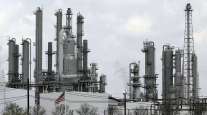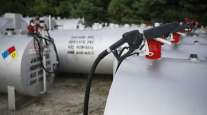Rising Oil Pushes Fuels Higher; Diesel Up 3.9¢, Gas Soars 14.7¢
This story appears in the July 22 print edition of Transport Topics.
Retail diesel prices rose for a second straight week, hitting $3.867 a gallon after advancing 3.9 cents, while gasoline prices soared, according to the Department of Energy.
While the average cost of trucking’s main fuel is below its 2013 peak of $4.159, set in February, it is still 17.2 cents a gallon more than it was a year ago, according to DOE’s weekly survey of fueling stations, which was published July 15.
Gasoline, meanwhile, jumped 14.7 cents a gallon to $3.639, snapping a string of four consecutive declines, DOE’s Energy Information Administration said.
The turnaround in diesel follows big gains in the price of crude oil traded in New York, which has been rising to match the price of oil on London-based exchanges.
“It’s a concern for us. It could cut into our margins, and that means our fuel surcharge or base rates might have to go up,” said Curt Burgener, president and owner of tank-truck carrier Burgener Transpro in Fort Collins, Colo., in reaction to the diesel price hikes.
“It’s crude oil, especially for diesel, but there have also been some refinery snags, which is typical for the dog days of summer,” said Denton Cinquegrana, chief oil analyst at the Oil Price Information Service, when asked why retail prices are rising.
From June 21 to July 10, crude oil futures contracts on the New York Mercantile Exchange soared in price by 13.7% to $106.52 a barrel from $93.69. Prices went even higher July 18 closing at $108.04 per barrel — the highest closing price since March 2012.
Over the past two weeks, the diesel average has increased 5 cents a gallon after falling by 7.3 cents over the six weeks ended July 1.
The nation’s refineries boosted distillate production, including ultra-low-sulfur diesel, relative to gasoline last week.
Distillate production was 5.08 million barrels a day during the week ended July 12, up from 5.04 million the previous week and 4.76 million a year ago. Ultra-low-sulfur distillate was a strong majority of that — 93.7%.
Gasoline production went the other way, declining to 9.05 million barrels from 9.59 million the week before.
The increase in gas prices was particularly severe in the Midwest, where the average jump was 23 cents a gallon. EIA economist Sean Hill said that refinery outages and crude oil prices were the main issue.
U.S.-produced crude had been priced more cheaply than oil traded in London, Hill said, and that was of benefit to Midwestern refineries with access to the cheaper oil. As U.S. prices have risen to meet the international price, though, Midwestern refineries have had to deal with much higher prices for inputs, Hill said.
The closing price for oil on London’s Intercontinental Exchange was $108.70 a barrel.
Burgener said he and his managers work constantly to reduce the effect of fuel swings on their financial results. The carrier buys about 1.5 million gallons of diesel a year for its 100 company trucks, and Burgener said he hedges about half of that volume through his vendor.
“You can do a financial hedge on paper, but we take actual delivery of the fuel instead,” Burgener said, describing what is often referred to as a “wet hedge.”
“For the last year or two, we’ve taken a fixed price on fuel and locked it in. Prior to that, we put a cap in place, but that got too costly,” he said.
At Roehl Transport, No. 68 on the new Transport Topics Top 100 list, the Marshfield, Wis.-based truckload carrier buys 26 million gallons of diesel a year for its nearly 2,000 company trucks, said its controller, Patrick Anderson.
Roehl is phasing out its engines made in 2006 and earlier for new trucks with selective catalytic reduction power plants. Roehl also is investing in trailer skirts and fairings for more efficient aerodynamics.
“We’ve determined that we really do realize cost savings on this, especially when you keep a trailer for 10 years,” Anderson said. A savings of 5% of consumption is considered a success, he said, as it translates to 1.3 million gallons of diesel not purchased at about $3.85 a gallon, or more than $5 million.




